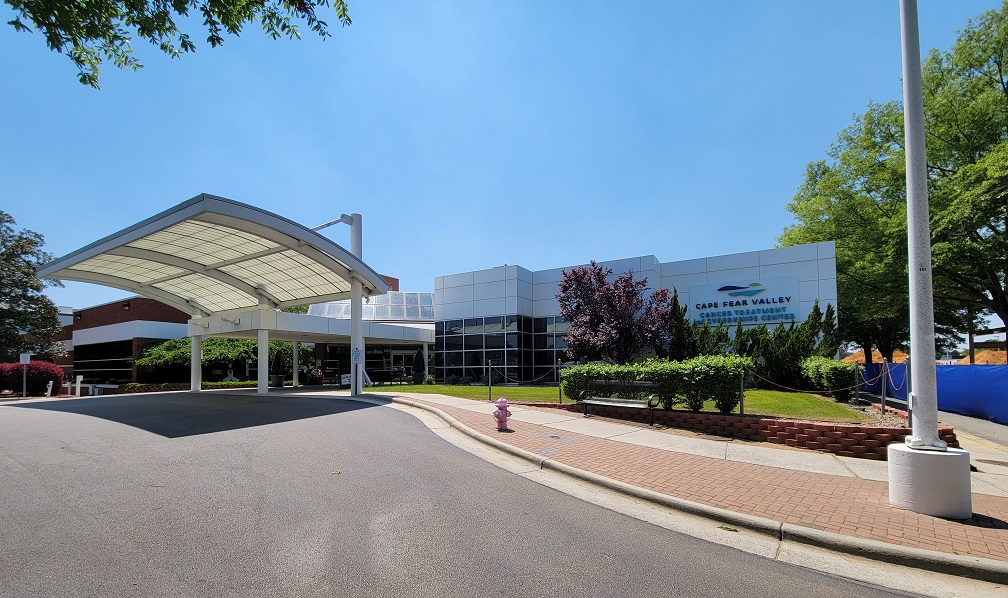
The Commission on Cancer (CoC), a quality program of the American College of Surgeons (ACS) has granted three-year accreditation to the cancer program at Cape Fear Valley Medical Center as an Academic Comprehensive Cancer Program.
To earn voluntary CoC accreditation, a cancer program must meet 34 CoC quality care standards, be evaluated every three years through a survey process, and maintain levels of excellence in the delivery of comprehensive patient-centered care.
The Academic Comprehensive Cancer Program designation is an advancement from the program’s previous designation as a Comprehensive Community Cancer Program, and further means that the program participates in postgraduate medical education in at least four program areas, and that it participates in cancer-related clinical research as well as offering the full range of diagnostic and treatment either on-site or by referral. Cape Fear Valley Health has residency programs in Internal Medicine, Family Medicine, General Surgery, and Emergency Medicine. Only 13 percent of cancer treatment programs hold the Academic Comprehensive Cancer Program designation.
Because it is a CoC-accredited cancer program, Cape Fear Valley Cancer Treatment and Cyberknife Center takes a multidisciplinary approach to treating cancer as a complex group of diseases that requires consultation among surgeons, medical and radiation oncologists, diagnostic radiologists, pathologists, and other cancer specialists. This multidisciplinary partnership results in improved patient care.
“This accreditation is considered the gold standard in cancer care,” said Cape Fear Valley’s Executive Corporate Director of Oncology Services Kanwar Singh. “It’s a voluntary accreditation with prescriptive standards, and we challenge ourselves to meet these rigorous quality care standards. Because the accreditation is multi-disciplinary in nature, it also acknowledges the teamwork from areas of Cape Fear Valley beyond the Cancer Center.”
The CoC Accreditation Program provides the framework for Cape Fear Valley Cancer Treatment and Cyberknife Center to improve its quality of patient care through various cancer-related programs that focus on the full spectrum of cancer care including prevention, early diagnosis, cancer staging, optimal treatment, rehabilitation, life-long follow-up for recurrent disease, and end-of-life care. When patients receive care at a CoC facility, they also have access to information on clinical trials and new treatments, genetic counseling, and patient centered services including psycho-social support, a patient navigation process, and a survivorship care plan that documents the care each patient receives and seeks to improve cancer survivors’ quality of life.
Like all CoC-accredited facilities, Cape Fear Valley Cancer Treatment and Cyberknife Center maintains a cancer registry and contributes data to the National Cancer Data Base (NCDB), a joint program of the CoC and American Cancer Society. This nationwide oncology outcomes database is the largest clinical disease registry in the world. Data on all types of cancer are tracked and analyzed through the NCDB and used to explore trends in cancer care. CoC-accredited cancer centers, in turn, have access to information derived from this type of data analysis, which is used to create national, regional, and state benchmark reports. These reports help CoC facilities with their quality improvement efforts.
The American Cancer Society estimates that more than 1.7 million cases of cancer will be diagnosed in 2018. There are currently more than 1,500 CoC-accredited cancer programs in the U.S. and Puerto Rico, CoC-accredited facilities diagnose and/or treat more than 70 percent of all newly diagnosed patients with cancer. When cancer patients choose to seek care locally at a CoC-accredited cancer center, they are gaining access to comprehensive, state-of-the-art cancer care close to home. The CoC provides the public with information on the resources, services, and cancer treatment experience for each CoC-accredited cancer program through the CoC Hospital Locator at https://www.facs.org/search/cancer-programs.
Established in 1922 by the American College of Surgeons, the CoC is a consortium of professional organizations dedicated to improving patient outcomes and quality of life for cancer patients through standard-setting, prevention, research, education, and the monitoring of comprehensive, quality care. Its membership includes Fellows of the American College of Surgeons. For more information, visit: www.facs.org/cancer.
About Cape Fear Valley Health
Cape Fear Valley is an 930-bed, 8-hospital regional health system, the 8th largest in North Carolina, with more than 1 million inpatient and outpatients annually. A private not-for-profit organization with 7,000 employees and 850 physicians, it includes Cape Fear Valley Medical Center, Highsmith-Rainey Specialty Hospital, Cape Fear Valley Rehabilitation Center, Behavioral Health Care, Bladen County Hospital, Hoke Hospital, Health Pavilion North, Health Pavilion Hoke and Harnett Health. For more information, visit www.CapeFearValley.com.
Source: Cape Fear Valley Medical Center

Kristen Botts co-founded the program with her husband, Nathan Botts, who is a Veteran himself. Photos provided by Kristen Botts.An organization helping Veterans live a full life after their service in the U.S. Military wants to connect Veterans and d

Patrick NoblesHuntington Bancshares Incorporated announced on Feb. 2 that it has closed its merger with Cadence Bank, a regional bank headquartered in Houston, Texas and Tupelo, Miss. This strategic partnership accelerates Huntington’s growth in

There is extensive dialogue surrounding Fayetteville as a travel destination or city aimed at recruiting new businesses and new residents. As someone who moved here from out of state, I thought it could be fun to share my personal experience as